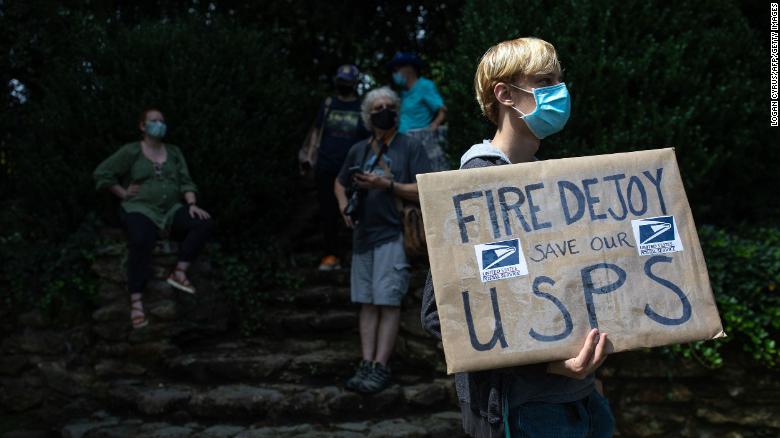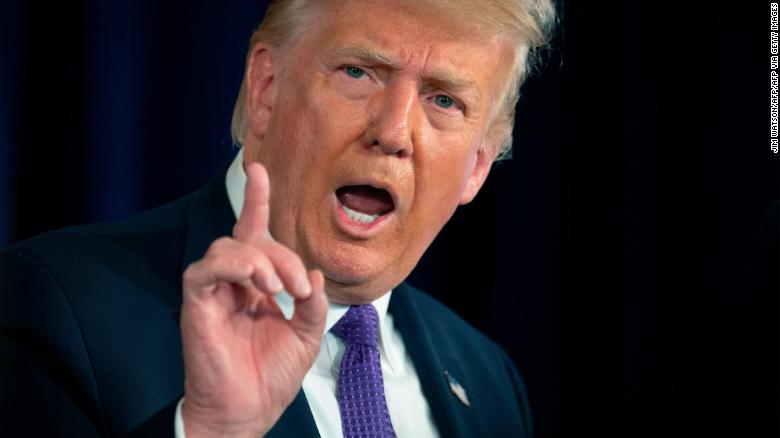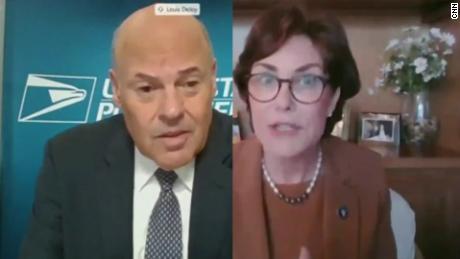- Anatomy of an about-face: Inside the Postal Service damage control
Anatomy of an about-face: Inside the Postal Service's attempts at damage control
Washington (CNN)Watching television in his private dining room earlier this month, President Donald Trump was surprised at the latest federal entity being skewered in a segment on cable news: his own United States Postal Service.Of all the government agencies, Trump mused to aides, according to a person familiar with the encounter, how had the Post Office become so controversial?It's a question with a long answer that rests partly on Trump's own actions. Once an aspect of daily life so reliable it went mostly unnoticed, the Postal Service now finds itself at the center of a political scandal so grave that, according to election officials and voting experts, the integrity of the election is at stake.This week, Trump privately shrugged off reports that veterans and older Americans are experiencing delays in receiving their prescription medications, according to another person familiar with the conversations. And he told aides he believed the agency's recent problems were caused by President Barack Obama, according to that person.Yet many inside the agency and at the White House believe the current crisis was avoidable -- and, like so many of this administration's biggest controversies, that Trump bears some responsibility, according to sources in and around USPS and within the administration. Over the past three weeks, longstanding Republican goals of reforming the Postal Service collided with Trump's bombastic and misleading rhetoric about voter fraud, creating a perception that the administration was purposely working to slow down the mail ahead of an election where millions of people will rely on it to vote safely.The mounting pressure set in motion a dramatic attempt at damage control. Louis DeJoy, the newly appointed and suddenly beleaguered postmaster general, dialed into an emergency meeting of the USPS board last weekend. Afterward, the agency retained a crisis management firm as he prepared for his first congressional testimony. By Tuesday, the Postal Service announced it was suspending certain changes to its operation, like halting overtime pay for mail carriers and removing high volume letter sorters and blue postal boxes.In Friday's hearing, DeJoy -- a major Republican donor -- broke with the President on many of the key issues currently facing his agency, from funding to mail-in ballots. He called accusations that he would attempt to slow the mail at Trump's request "outrageous." And he said he would prioritize election mail no matter what postage is used. A group of protestors hold a demonstration in front of Postmaster General Louis DeJoy's home in Greensboro, North Carolina on August 16, 2020. - DeJoy has recently come under fire for what's perceived as steps ordered by the Trump administration to slow down the mail to help suppress absentee votes.Many of DeJoy's allies viewed it as an attempt to salvage the Postal Service's reputation, and his own, even as Trump does little to rebut accusations he is infusing the service with politics.But numerous experts and union leaders say the damage is already done.In an email obtained by CNN, managers were told just hours after DeJoy's announcement he was suspending changes not to reconnect any machines disconnected in the removal process. DeJoy told lawmakers Friday that he has "no intention" to bring back the machines because "they're not needed." And he wasn't able to provide specific details on how he would ensure election mail arrived on time.Democrats remain unsatisfied with the steps -- and used the controversy as a bludgeon on Trump during their presidential nominating convention this week. Democratic leaders in the House were convening a rare Saturday session to vote on legislation to allocate $25 billion to the US Postal Service and ban operational changes that have slowed mail service around the country. On the eve of the vote, the White House threatened to veto the bill.Postal Service officials and even some White House aides privately concede that Trump, who has maintained a fixation with the Postal Service since taking office, has aggravated the current scandal through his repeated and false attacks on mail-in voting, which has created an opening for Democrats to accuse him of deliberately undermining the mail to achieve political end sources in and around USPS told CNN.In reality, multiple officials familiar with the matter describe a complicated situation in which long-planned changes at the Post Office coincided with a deadly pandemic that also overlapped with Trump's attacks on mail-in voting -- all of it against the highly charged backdrop of a defining presidential election.For DeJoy, suddenly caught in the crossfire, fixing the mess likely means having to further repudiate some of Trump's own ideas about the Post Office and potentially disrupt the President's apparent agenda of sowing distrust among voters over the integrity of vote-by-mail.
A group of protestors hold a demonstration in front of Postmaster General Louis DeJoy's home in Greensboro, North Carolina on August 16, 2020. - DeJoy has recently come under fire for what's perceived as steps ordered by the Trump administration to slow down the mail to help suppress absentee votes.Many of DeJoy's allies viewed it as an attempt to salvage the Postal Service's reputation, and his own, even as Trump does little to rebut accusations he is infusing the service with politics.But numerous experts and union leaders say the damage is already done.In an email obtained by CNN, managers were told just hours after DeJoy's announcement he was suspending changes not to reconnect any machines disconnected in the removal process. DeJoy told lawmakers Friday that he has "no intention" to bring back the machines because "they're not needed." And he wasn't able to provide specific details on how he would ensure election mail arrived on time.Democrats remain unsatisfied with the steps -- and used the controversy as a bludgeon on Trump during their presidential nominating convention this week. Democratic leaders in the House were convening a rare Saturday session to vote on legislation to allocate $25 billion to the US Postal Service and ban operational changes that have slowed mail service around the country. On the eve of the vote, the White House threatened to veto the bill.Postal Service officials and even some White House aides privately concede that Trump, who has maintained a fixation with the Postal Service since taking office, has aggravated the current scandal through his repeated and false attacks on mail-in voting, which has created an opening for Democrats to accuse him of deliberately undermining the mail to achieve political end sources in and around USPS told CNN.In reality, multiple officials familiar with the matter describe a complicated situation in which long-planned changes at the Post Office coincided with a deadly pandemic that also overlapped with Trump's attacks on mail-in voting -- all of it against the highly charged backdrop of a defining presidential election.For DeJoy, suddenly caught in the crossfire, fixing the mess likely means having to further repudiate some of Trump's own ideas about the Post Office and potentially disrupt the President's apparent agenda of sowing distrust among voters over the integrity of vote-by-mail.Welcome to Washington
When a former logistics executive and Republican donor took over the Postal Service in mid-June, the news didn't garner much attention in a country ravaged by a pandemic and in the midst of a presidential campaign. But just over two months later, DeJoy is suddenly the central figure in a full-blown Washington controversy.Accounts of huge sorting machines being dismantled and trucks hauling away blue mailboxes shot around social media, fueling concerns that the mail was purposefully being slowed down ahead of the election. The attendant outcry prompted the USPS inspector general to confirm it was reviewing DeJoy's changes and his potential financial conflicts of interest.By last Friday night, reality appeared to have set in among Postal Service officials that they had lost control of the narrative. The next afternoon, members of the Postal Service Board of Governors and DeJoy dialed into an emergency closed-door meeting that was called at the last minute. Joining by teleconference, they discussed "administrative" and "strategic issues." Afterward the agency engaged the PR firm Weber Shandwick to help manage crisis messaging -- and, a person familiar with the situation said, to combat some of the anti-Postal Service and mail-in voting rhetoric coming from the White House.A second emergency closed-door meeting was held that Monday night after DeJoy formally agreed to testify in front of House Democrats.Later in the week, DeJoy personally reached out to top Democrats Sen. Chuck Schumer and House Speaker Nancy Pelosi and vowed to answer questions from Democrats in writing ahead of Monday's hearing. DeJoy also agreed to participate in taped public service announcements alongside union leaders reiterating the safety of mail in voting -- a move that came as a surprise to some White House aides.Republicans rally to DeJoy
Once DeJoy was set to testify in front of the House, Senate Republicans scrambled to get him first in a bout of political maneuvering that reflects the current tensions surrounding the Postal Service. Sen. Ron Johnson's staff was informed by the agency that DeJoy would agree to testify at the House hearing on Monday morning before the information became public.When that word was passed along to Johnson, the Wisconsin Republican with jurisdiction over the Postal Service, he immediately made clear to his team that his panel would need to schedule its own hearing -- and it had to be before the House, according to a person involved in the matter.The committee staff got to work pulling together the hearing. It would be publicly scheduled for August 21 -- three days before the House hearing -- less than 24 hours later.Johnson's goal was to give DeJoy "a fair shot ahead of the House," the person said, and the chairman wasn't subtle about his intentions."The Postal Service has had significant financial problems for years, and it is important for everyone to fully understand its current fiscal challenges," Johnson said. "The postmaster general should have an opportunity to describe those realities before going before a hostile House committee determined to conduct a show trial."A Democratic Senate Homeland Security Committee aide sounded more skeptical."I think he probably wanted to help DeJoy amplify his own narrative and give him what I think he would call a little bit more friendly audience than he would face in the House," the aide said. "I think it's hard for members to take (DeJoy) at his word right now, he has not been transparent. He has not been forthcoming."The sudden scandal has amounted to a whirlwind for DeJoy. Some close to him say he is not one to seek the spotlight and did not expect to become the center of political controversy when he agreed take the job earlier this year.Friends encouraged him to take the role, and at a time when Trump's attacks on mail-in voting had yet to escalate, the position seemed in one of the more obscure corners of the federal government, where political interference seemed unlikely.The pandemic -- and Trump -- upended that perception. The constitutionally mandated Postal Service is now in the middle of intersecting political and medical crisis, its services suddenly central to an election in which many Americans will mail in their ballots instead of voting in person.That by itself would not necessarily place DeJoy in the crosshairs of political scandal. But Trump's insistence that universal mail-in-voting is rife with fraud -- a claim without any factual basis -- has inserted the postal service squarely into the firestorm.On Friday Trump continued assailing mail-in voting, suggesting during remarks to a conservative group in Virginia that people may use it to vote twice."You'll have double voting, where they send in a ballot, then they'll go and vote. That's going to be a big problem. They'll send in their ballot and they'll vote, too," he said. "I mean think of how ridiculous it is, right? Common sense."'He thinks it's envelopes and stamps'
 President Donald Trump speaks during a press conference in Bedminster, New Jersey, on August 15, 2020.It wasn't necessarily supposed to play out that way. Trump has directed ire toward the Post Office for years, frustrated because he believed it was subsidizing online retailers like Amazon (Trump has feuded with Amazon's CEO Jeff Bezos for what he believes is unflattering coverage in The Washington Post, which Bezos owns).Trump's views of the Postal Service have been colored by misperceptions and conspiracies for most of his presidency, people who have discussed the matter with him say."I don't think he understands the Post Office," one person close to the President said. "He thinks it's envelopes and stamps. The scale of it is foreign to him."In the early part of his administration, Trump told aides repeatedly he wanted to replace DeJoy's predecessor, Megan Brennan, with someone who would be more loyal and business oriented, according to two people familiar with the conversations. His frustrations were rooted not in mail-in voting but in his belief the US government was being ripped off by Amazon.In 2018, Treasury Secretary Steven Mnuchin led a task force on reforming the Postal Service, and has since inserted himself into the agency's finances -- steps critics warn have opened up the independent government agency to undue political influence.The Treasury Department recently struck a loan deal with USPS that gives the Trump administration more leverage to push for higher shipping prices for companies like Amazon, one of Trump's pet projects.A former Postal Service governor alleged in congressional testimony this week that Mnuchin led the administration's effort to politicize the Postal Service, including by seeking sensitive information about the USPS labor agreements, pricing and volume discounts -- particularly with customers like Amazon, UPS and FedEx.DeJoy's appointment has even come around for fresh scrutiny, as Democrats examine whether his selection in May skirted the normal selection process, and whether Mnuchin and other Trump administration officials were involved in his appointment.
President Donald Trump speaks during a press conference in Bedminster, New Jersey, on August 15, 2020.It wasn't necessarily supposed to play out that way. Trump has directed ire toward the Post Office for years, frustrated because he believed it was subsidizing online retailers like Amazon (Trump has feuded with Amazon's CEO Jeff Bezos for what he believes is unflattering coverage in The Washington Post, which Bezos owns).Trump's views of the Postal Service have been colored by misperceptions and conspiracies for most of his presidency, people who have discussed the matter with him say."I don't think he understands the Post Office," one person close to the President said. "He thinks it's envelopes and stamps. The scale of it is foreign to him."In the early part of his administration, Trump told aides repeatedly he wanted to replace DeJoy's predecessor, Megan Brennan, with someone who would be more loyal and business oriented, according to two people familiar with the conversations. His frustrations were rooted not in mail-in voting but in his belief the US government was being ripped off by Amazon.In 2018, Treasury Secretary Steven Mnuchin led a task force on reforming the Postal Service, and has since inserted himself into the agency's finances -- steps critics warn have opened up the independent government agency to undue political influence.The Treasury Department recently struck a loan deal with USPS that gives the Trump administration more leverage to push for higher shipping prices for companies like Amazon, one of Trump's pet projects.A former Postal Service governor alleged in congressional testimony this week that Mnuchin led the administration's effort to politicize the Postal Service, including by seeking sensitive information about the USPS labor agreements, pricing and volume discounts -- particularly with customers like Amazon, UPS and FedEx.DeJoy's appointment has even come around for fresh scrutiny, as Democrats examine whether his selection in May skirted the normal selection process, and whether Mnuchin and other Trump administration officials were involved in his appointment.Mounting frustration inside the Postal Service
Many administration officials said they believed the changes might have occurred with only minor public pushback had the pandemic not forced the issue of voting into the picture -- and had Trump not directly tied his opposition to emergency funding for the agency to his false claims against mail-in ballots.There has been significant frustration inside the agency about the slow response to the Democratic allegations in recent weeks. Each statement, or effort to address what Democrats were accusing the agency of doing, would take days or longer to move through the approval process. At various points efforts to push back, which seemed on track for public release, ended up going nowhere."The vacuum has been totally filled by Democrats and the union and we're all just sitting here waiting for 10 people to sign off on something," a source involved in conversations with senior USPS staff over the course of the last several weeks said.Experts said DeJoy's challenges do not stop merely at a publicity problem. Should the Postal Service's issues persist into November, it could prompt legal challenges as well."Anything that reduces the capacity of the mail or leads to delays could give rise to election litigation. USPS itself is warning states about potential problems, and that could have a deterrent effect on voters," said Michael Morley, a law professor at Florida State University who specializes in election emergencies.DeJoy needs to "place his actions in greater context" to assuage concerns of politicization, Morley said. He can do this by showing that these changes are part of the "ordinary course of business" and weren't ramped up because of the election, if that is the reality, he said.It is not just the agency that is now under pressure to explain itself as mail slowdowns persist and fears about a contested election mount. The White House is also struggling to provide a clear explanation for why the Postal Service began implementing changes that have led to a slowdown in mail and may cause states to miss voting deadlines in the fall.Speaking at a stop in Arizona after the decision to suspend the changes, Trump worked to distance himself from the recent controversy."No, I wasn't involved," he said.His chief of staff Mark Meadows similarly insisted that Trump wasn't directing DeJoy, a major donor to his campaign, to make any changes at the post office."President Trump at no time has instructed or directed the post office to cut back on overtime or any other operational decision that would slow things down," Meadows said.Yet Trump has stated clearly that he is blocking emergency funds for the Post Office as a way to prevent an expansion of mail-in voting during the pandemic. And he has done little to disguise the overt politicization of the Post Office under his watch, which includes filling both the Postmaster General role and a majority of the seats on the agency's Board of Governors with his loyalists."We just got the board," Trump said Tuesday.Trump met with DeJoy earlier this month for what the White House says was a "congratulatory" meeting following his appointment. Trump later claimed he hadn't spoken to DeJoy, even as he sang his praises.Friday's hearing
By the time Friday's hearing rolled around, DeJoy had spent time preparing for questions about his political independence with his advisers.Appearing on a screen with a blue Postal Service logo in the background, DeJoy seemed to distance himself from the President almost immediately, telling lawmakers he supported mail-in voting as well as funding for the Postal Service and that he would ensure that every single ballot was delivered.Asked by Sen. Gary Peters, the committee's top Democrat, whether he had ever discussed any of the agency's recent changes with the President -- "and I'll remind you you're under oath," Peters warned -- DeJoy was unequivocal."I have never spoken to the President about the postal service, other than to congratulate me when I accepted the position," he said.CNN's Phil Mattingly, Sunlen Serfaty, Jessica Schneider and Marshall Cohen contributed to this report.
To the best of my ability I write about my experience of the Universe Past, Present and Future
Top 10 Posts This Month
- Trump to make announcement with Hegseth on shipbuilding from Mar-a-Lago
- Here's how much ACA premiums would have risen this year without tax subsidies:
- As storms inundated Washington state, federal grants for flood mitigation work sat on hold
- quote from Wikipedia: Mark Carney
- How the global food system is impacting obesity and climate change: Study
- Deputy AG says removing photos from Epstein files has 'nothing to do' with Trump(Sure thing) (ha ha)
- What are the real Truths of Life?
- English actors Tom Hiddleston and Zawe Ashton welcome their second child
- gold has surged 70% since the Start of the Year
- I thought this was worth rereading: article from December 23rd regarding Gold surge of 70% this year
Subscribe to:
Post Comments (Atom)






















No comments:
Post a Comment